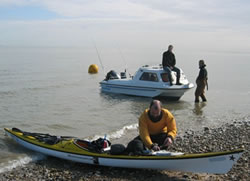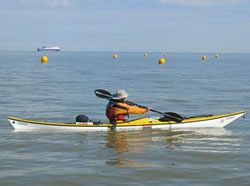Five months at sea for Graham King to raise money for Musequality and MS Society
|
A member of Chiswick Pier Canoe Club has set off on a round Britain kayak trip to raise money for charity – and fulfil a long-term ambition.
Former IT consultant Graham King started his journey on the Thames at Teddington Lock, ended his first day’s paddling at Greenwich and will today (Sunday) be on his way round the north Kent coast. With 2,500 miles to cover he expects the trip to take five months which means paddling about 24 miles a day, allowing for one rest day a week and anticipating one day a week not being able to take to the water because of bad weather. He expects to spend eight hours a day paddling, at a cruising speed of about three knots, and to be back home by September.
Asked if he feared isolation on this unusual and lonely trip, he said: “As a sea kayaker, I’m part of a surprisingly close-knit community. Several of the sea kayakers at my club (the Chiswick Pier Canoe Club) are planning to paddle alongside me for a day or two at a time. And I'm looking forward to scrounging company, food and showers from other friends (paddling and non-paddling) around the coast. My wife and daughter will meet me at some point,” he said, hopefully.
He is particularly looking forward to reaching Anglesey, a sea-kayaking Mecca, in late April/early May where he expects to see several paddling friends. He’ll also have a week’s break on the Isle of Skye at the end of May – to attend the biennial sea kayak symposium. In between, he’ll be swapping his Rockpool Alaw Bach kayak for a newly-developed expedition kayak, the Rockpool GT, which he will test for the manufacturer, Rockpool Kayaks.
Although Graham is an experienced kayaker, the journey will, of course, be extremely hard work and physically exhausting with difficult decisions to make every day.
“The toughest decisions will be whether to paddle when conditions are not perfect. Every day I have to get a weather forecast and predict tidal streams – to get an idea of the boat’s speed over the ground. I then add pilotage notes, shoreline features, details of the fetch (the distance over water that the wind blows to reach me) and sea-bed topography to assess the state of the sea. Next I look at how committing the day's paddle is – whether there are places to get off the water if I need to, or if I must face a big open crossing or many miles along a shoreline closed off by cliffs or big surf. All these have to be considered before I can decide if it is wise to set off that day or if I should wait for conditions to improve,” he explained.
He knows how important it is to be well-prepared. He’s taking a dry-suit to protect himself against hypothermia, in case he finds himself immersed in water. He has a marine VHF radio, a satellite beacon and distress flares to summon help, plus first aid and boat repair gear, a bivvy bag, tent and helmet – essential if he needs to come ashore through surf or on to rock.
“A solo trip is in some ways tougher than travelling with others alongside, ”he said. “There are no extra hands to manhandle the loaded boat ashore and no one to help make those difficult decisions – though it also means I should be less pressured into paddling in marginal conditions.”
As with all physical endurance tests, he’ll have “more water than I think I’ll need” and high-energy foods, such as nuts and raisins, to keep him going.
But it will not be without its pleasures. He admits to making time for “the occasional beer” and is looking forward to enjoying wildlife and geology along the route. “Sea kayaking is a unique way to see marine wildlife as many creatures seem not to recognise the boat and paddler as potential threats. There will be seals and seabirds in abundance and, I hope, the occasional cetacean – dolphins, porpoises and whales. The quid-pro-quo is that I will be taking care to observe proper protocols to avoid disturbing nesting seabirds and nursing seals, for example.
“Sea kayaking also grants a unique level of access to coastal geology. Some of the rock formations and sea caves are truly spectacular. I’m looking forward to some astonishing sunsets, star-filled night skies, spectacular wildlife – and the hospitality of new and old friends,” he said encouragingly. However he added a note of caution: “I wouldn’t want to encourage anyone to get in a boat without proper training and preparation; there are real risks to be dealt with.”
Where will he be visible? “Depending on the conditions and the plan, I might be very close inshore, eddy-hopping against a tidal stream, or many miles out on an open crossing, such as the Bristol Channel or paddling from Anglesey to the Isle of Man. Sea kayaks are notoriously difficult to spot at sea, but very easy to tempt ashore with promises of food, beer and showers. When I’m near the coast, people should be able to see the boat – if the Musequality and MS Society stickers stay stuck!” he laughed.
So why did he decide to set off on this journey? “Because when I'm old I don't want to be wondering whether I could have done it,” he said candidly. “ Also, it's an opportunity to explore large parts of the
British coastline that I might otherwise never get to.” What about his plans afterwards? “I’ll be changing careers to physics teaching,” he revealed.
As for things he’ll miss, such as birthdays, he confesses: “I'm not a great one for anniversaries, much to the irritation of my family. But I will miss some great music – I sing with the Winchester-based early music group Index Cantorum and the Anton Bruckner Choir in London.”
It was his love of music that made him trawl the Internet for music charities to raise money for – and came across Musequality, founded by Chiswick resident and professional violinist David Juritz to change the lives of underpriviledged children in the developing world. “I was looking for a charity that reflects the things that I think are marvellous about music-making. It has intrinsic value and brings many incidental benefits such as self-confidence, self-discipline, analytical skills, organisational skills, and team-working. To find that Musequality is based locally was just a bonus,” he explained.
He chose to raise money for the Multiple Sclerosis Society as well, because: “I've known a few people with the condition and it can be a ghastly business. Carers and researchers deserve support”.
If you’d like to sponsor Graham as he paddles downstream along the Thames, through the English Channel, around Land’s End and Cape Wrath, down the North Sea coast and upstream along the Thames to Teddington you can make donations at: http://justgiving.com/kayakfreelunch (to support Musequality) and http://justgiving.com/kayakfreelunch2 (to support the Multiple Sclerosis Society).
If you’d like to keep track of Graham’s journey as he paddles around Britain, he’ll be ringing home or nipping in to Internet cafés to update his blog: http://freelunchlog.blogspot.com.
March 30, 2009

